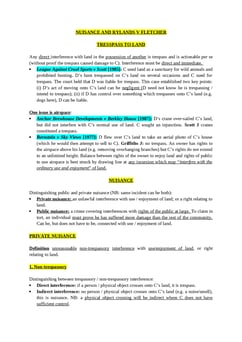Tate & Lyle v GLC [1983] 2 AC 509
Judgement for the case Tate & Lyle v GLC
Table Of Contents
Ferry terminals constructed by the defendants in the River Thames caused excessive silting. This disrupted the plaintiff's business by obstructing access to their jetty and they had to spend large sums on dredging operations.
Their claim in private nuisance was dismissed because the jetty itself was unaffected and they had no private rights in the property of the river beds.
However the HL held that a claim in public nuisance usually entitled a claim for damages and that reliance on statutory authority was only a defence if Defendant exercised their authority with reasonable care (not done) and therefore Defendant was liable to Plaintiff for the cost of dredging that would have been avoided if the terminals had been designed to avoid siltation as much as possible.
Lord Templeman (majority)
One cannot complain of private nuisance if one has no proprietary interest in the thing being damaged i.e. the river.
An individual who suffers damage resulting from a public nuisance is, as a general rule, entitled to maintain an action.
An alternative design was possible which would have limited siltation to 25% of that which actually occurred, so that the costs awarded are the costs of de-siltation had only the “inevitable” siltation actually occurred from a reasonably careful use of statutory authority (i.e. 25% of what actually occurred).
For Further Study on Tate & Lyle v GLC
Need instant answers? Our AI exam tutor is here to help.
Ask questions 🙋 Get answers 📔 It's simple 👁️👄👁️
Our AI is educated by the highest scoring students across all subjects and schools. Join hundreds of your peers today.
Get StartedSimilar Cases
Related Product Samples
These product samples contain the same concepts we cover in this case.
| Tort Law | Nuisance Notes (70 pages) |
| Tort Law | Nuisance Notes (10 pages) |

